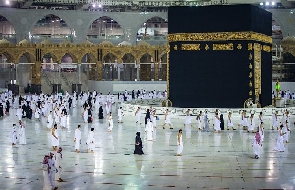Every year, Ghanaian citizens embark on the sacred journey of Hajj to Mecca. Despite the hefty fees paid to the Ghana Hajj Board, their pilgrimage is often marred by stampedes, congestion, infections, and shortages of basic necessities, sometimes resulting in injury or loss of life.
This situation has prompted calls from civil society organizations and Muslim clerics, including the Chief Imam's office, to depoliticize the process and allow for a fundamental shift in the management of Hajj operations to prioritize the welfare of pilgrims over the political interests that have dominated the board since its inception.
Calls for Depoliticization
Speaking on the issue, Sheikh Arimiyawu Shaibu, Public Relations Officer of the Office of the Chief Imam, emphasized the need for the government to begin the depoliticization process. He suggested that this would provide equal opportunities for all political parties to sponsor their members for the annual Hajj, irrespective of whether they are in power. He highlighted that political parties only show interest in sponsoring Hajj operations when they are in power, making Hajj affairs overly political.
Reactions from Hajj Board
Reacting to these claims, Alhaji Abdul Rahman Gomda, PRO of the Ghana Hajj Board and News Editor of the Daily Guide, acknowledged that the tradition has been for the party in power to sponsor its preferred members for Hajj each year. He admitted that this practice is well-known within the Muslim community and political circles but does not align with the core essence of Hajj operations and Islamic requirements for the welfare of pilgrims.
Suggestions for Reform
Kwesi Pratt, Managing Editor of the Insight Newspaper, recommended several steps for depoliticizing Hajj operations. He proposed the establishment of an independent oversight committee and the end of political patronage in pilgrim activities, or at least limiting political involvement to party leaders only. This would allow parties to sponsor Hajj participants even when they are not in power, whiles taking into account the economic conditions of those who cannot afford Hajj tickets.
Pratt emphasized the importance of strict adherence to quotas and the enforcement of these limits to avoid overcrowding and logistical challenges. He also called for the Ghana Hajj Board to promote public awareness and education on Hajj affairs, ensure financial transparency, strengthen institutional capacity, address the socio-economic issues of potential pilgrims, and engage Muslim leaders in the depoliticization process. According to Pratt, this process is necessary and achievable but requires strong advocacy from the Muslim community.
Issues with Non-Hajj Visas
The Hajj Board attributes issues such as stampedes, congestion, and shortages to pilgrims using non-Hajj visas, which are more affordable but illegal. The PRO advises those interested in Hajj to follow the procedures laid down by the Hajj Board to avoid the inconveniences and difficulties encountered during Hajj operations.
However, pilgrims argue that these non-Hajj visas offer better value for money, considering the sub-par experience provided during Hajj operations in Mecca. They call on the government, through the Ministry of Foreign Affairs and Muslim leaders, to depoliticize Hajj affairs to alleviate their suffering.
Recent Developments and Challenges
Last year, the Saudi Arabian government allocated a quota of 6,000 pilgrims to Ghana, but 6,730 participated. This year, a quota of 4,000 pilgrims has been set, with each required to pay $75,000 to cover travel, accommodation, transportation, food, health, security, and return to Ghana. Despite arrangements between the Ghana Hajj Board and the Saudi government, political interference and the failure of some Muslims to use official channels exacerbate the challenges faced during the pilgrimage.
Assurance from Hajj Board
Despite these challenges, the Executive Secretary of the board, Alhaj Farouk Hamza, has assured pilgrims of a comfortable Hajj experience this year. The media and the general public, following several engagements, expect better conditions and a reduction in casualties, injuries, or sickness during this year's pilgrimage.
In conclusion, depoliticizing Hajj operations is crucial to ensuring the welfare of Ghanaian pilgrims. By prioritizing transparency, efficiency, and the interests of pilgrims, the government and relevant authorities can uphold the sanctity of the pilgrimage and honor the religious obligations of its citizens.
Click to view details



Opinions of Monday, 27 May 2024
Columnist: A.G. Naeem Ahmed



















